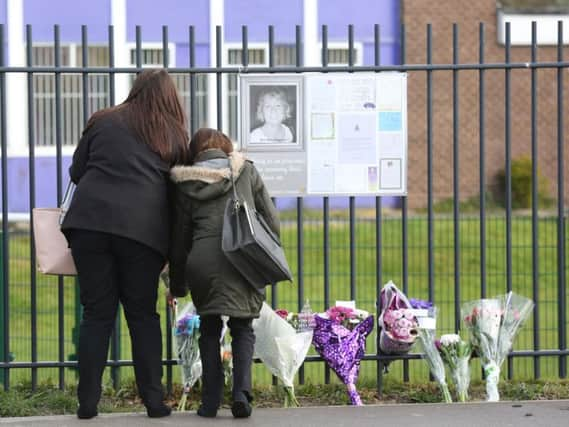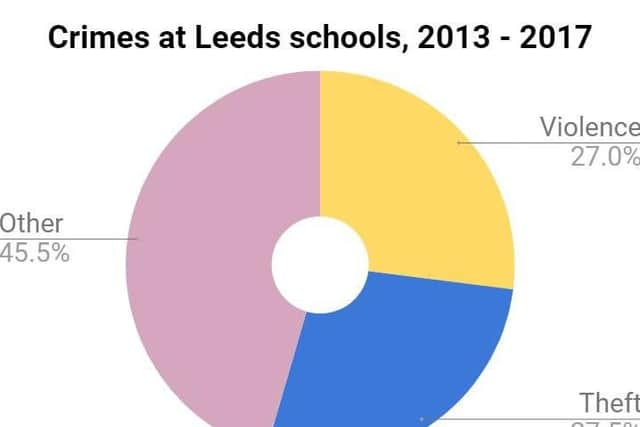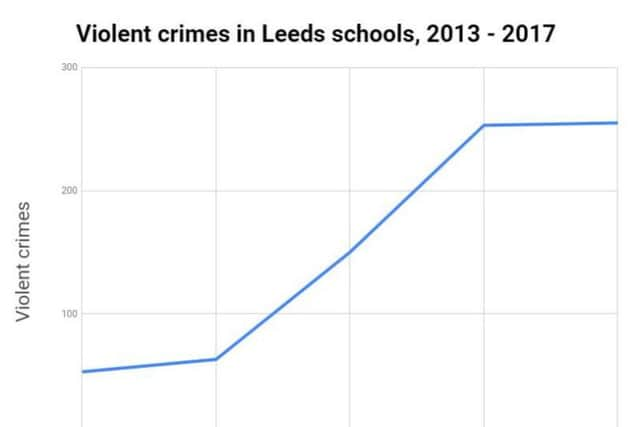Violent crime in Leeds schools quadruples since teacher's murder in classroom


Now, with schools across the region seeing rising crime levels, West Yorkshire’s Police and Crime Commissioner Mark Burns-Williamson has called for Government help to “prevent a generation from entering into criminal activity”.
Police recorded 255 violent crimes at schools in Leeds last year, up from 63 in 2014, the year of Mrs Maguire’s murder.
Advertisement
Hide AdAdvertisement
Hide AdViolence made up more than a quarter of all crime recorded at the city’s schools over the past five years, figures obtained through the Freedom of Information Act show.


Killed in classroom
In April 2014, 61-year-old Spanish teacher Ann Maguire was stabbed to death by her 15-year-old pupil Will Cornick in front of horrified classmates at Corpus Christi Catholic College in Leeds, where she had taught for 41 years.
It remains the only case in which a teacher has been killed by a pupil in a British classroom.
After an inquest into Mrs Maguire’s death, coroner Kevin McLoughlin wrote to Ofsted asking it to consider making it mandatory for inspectors to review and report on how a school protects pupils and staff from the risk of violent attack.


Advertisement
Hide AdAdvertisement
Hide AdThe report, published earlier this year, said there was an unquestionable need to take action over the issue of weapons in schools.
Ofsted said it would consider the matter as part of a wider review.
'Disjointed education system'
Mr Burns-Williamson said: “I believe the impact of a disjointed and under-pressure education system is taking its toll overall and I am concerned to see that instances of violence and weapons have increased within schools across West Yorkshire, albeit I am also confident that more accurate and robust incident and crime recording practices have been put in place during this period by West Yorkshire Police.”
Mr Burns-Williamson raised concerns about the rising number of pupils being excluded from schools, saying this was “imposing additional strain upon policing and communities with more young people outside mainstream education”.
Advertisement
Hide AdAdvertisement
Hide AdAnd he called for more money for youth services, which he said “have been pretty much decimated in recent years”.
He said: “Currently, the only realistic prospect of tackling these issues rests within more partnership working and seeking opportunities and developing strategies for early intervention and prevention.
“However, this requires investment and a concerted and co-ordinated approach spanning a number of years.
“If we are to truly resolve this and potentially prevent a generation from entering into criminal activity, the Government must look again at the provisions currently being offered through education, youth services and wider community safety plans to avoid the damaging consequences.”
Advertisement
Hide AdAdvertisement
Hide AdA Government spokesperson said: “Permanent exclusions should only be used as a last resort and must be justified and reasonable. Whilst there has been an increase in exclusions, there are still fewer than ten years ago and we have launched an externally-led review to look at how schools use exclusions.
“More broadly, the Government’s Serious Violence Strategy puts a stronger emphasis on steering young people away from violence, helping them to change their behaviour and actions before they reach the stage where they are at risk of entering the criminal justice system.”
Police officers in schools
West Yorkshire Police said some of the rise could be attributed to improvements in crime recording.
Superintendent Justine Plumb said: “West Yorkshire Police works closely with schools through our Safer Schools Partnership.
Advertisement
Hide AdAdvertisement
Hide Ad“We have dedicated Safer Schools Officers in more than a third of our secondary schools.
“Their roles are tailored to the different needs of the schools but their main aim is early intervention, building positive relationships and helping pupils to be safe and feel safe.”
She said PCSOs were also now going into primary schools, so that children from a young age could engage with the police.
She added: “The force has recently supported a national initiative, ‘Operation Sceptre’, in relation to knife crime. Officers from all five districts went into schools to engage and deliver knife crime awareness training in schools in a bid to prevent offences.”
Recording of crime 'very different now'
Advertisement
Hide AdAdvertisement
Hide AdThe authorities in Leeds have worked in partnership with headteachers for a decade now to run a programme that provides dedicated police officers to all participating secondary schools.
Safer Schools, led by the city’s community safety partnership, currently has a team of 27 officers whose whole focus is on supporting those schools in reducing crime.
Neighbourhood policing teams regularly visit primary schools and intensive workshops are run for children involved in knife crime.
Paul Money, chief officer of Safer Leeds, believes the commitment in terms of policing resource is unique among the Core Cities Group that also includes the likes of Birmingham, Liverpool and Manchester.
Advertisement
Hide AdAdvertisement
Hide Ad“Young people are just about the most important group of people we could engage with,” he said.
“The point about being in the school isn’t about criminalising the kids or being apologists for recorded crime.
“The fact is we’re there and we’re engaging.
“Being there at the early stage of an issues allows us to take an approach that’s family-centred. It’s got to be siblings of offenders, parents – it’s about engaging that family.”
Leeds has, in line with the regional picture, seen an increase in criminal offences recorded at schools but this is not viewed as a reason for alarm.
Advertisement
Hide AdAdvertisement
Hide AdChief Inspector Richard Padwell, who oversees Safer Schools on behalf of the police, said: “The more people we have in schools, the more is reported. The guidelines for us to decide whether we actually record a crime has completely changed too.
“Back in 2013, many incidents would not be recorded as a crime – that’s very different now.
“Unless we have a strong reason not to, it’s recorded as a crime.”
This does not mean criminalising children though, and a restorative approach will be used wherever appropriate, Chf Insp Padwell said.
Advertisement
Hide AdAdvertisement
Hide AdEvery effort has been made to resist austerity pressures that could mean cuts to the programme, although there has been a small reduction as some schools opted out of Safer Schools and its 50/50 funding arrangement with West Yorkshire Police.
Steve Walker, director of children’s services at Leeds City Council, said the advent of academies had changed the role of councils from one of control to one of partnership, but said everyone was clear that “irrespective of the type of school that children attend, they’re Leeds children”.